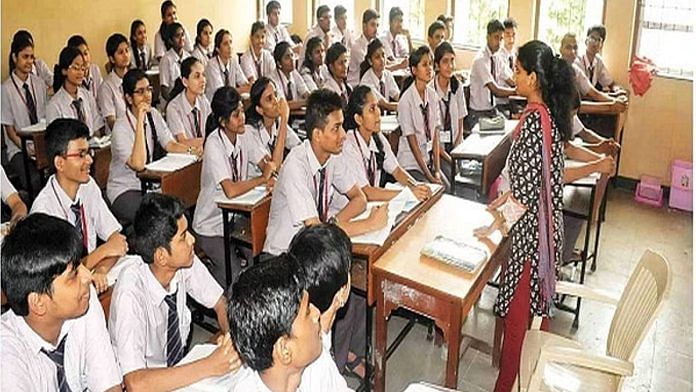New Delhi: Expressing concern over the removal of sections of the previous political science syllabi for classes 6 to 12 from this year’s textbook as part of a “rationalisation exercise” by the National Council for Educational Research and Training (NCERT), professors and teachers who had originally developed the content have asked for their names to be dropped from the books, ThePrint has learnt.
In a letter written to NCERT director Dinesh Saklani Wednesday, 33 members of the Textbook Development Committee have said that the “decision of who decides what is unacceptable and what is desirable has been kept rather opaque, violating the core principles of transparency”.
In the letter, which has been accessed by ThePrint, the experts have further contended that though NCERT may have intellectual property rights over textbooks, it does not have the “liberty to make substantive changes, minor or major, and then claim that the same set of contributors and chief advisors continue to be responsible for the revised text as it now stands”.
Wednesday’s letter by the expert committee members comes days after political scientists Yogendra Yadav and Suhas Palshikar in a public letter written to the NCERT asked for the removal of their names from the political science textbooks for classes 9 to 12, stating that the books had been “mutilated beyond recognition”.
The NCERT in a response to their letter had refused their request, emphasising its right to make changes based on copyright ownership. The two have hit back at the school education regulator stating that while the NCERT may have the “legal right to distort and mutilate the text”, they had the moral and legal right to disassociate their name from a textbook that they did not endorse.
Both were part of The Textbook Development Committee constituted in 2005 to develop the syllabus according to the National Curriculum Framework (NCF), and chief advisors for the political science textbooks for classes 9 to 12.
Earlier too, some academics had raised the issue of not being consulted for the syllabus “rationalisation” exercise.
Wednesday’s letter was signed by the likes of Muzaffar Assadi, dean, faculty of arts, University of Mysore, Kanti Prasad Bajpai of the National University of Singapore, Sabyasachi Basu Ray Chaudhury of the Rabindra Bharati University, Kolkata, Rajeev Bhargava, honorary fellow, Centre for the Study of Developing Societies (CSDS), Delhi and Dwaipayan Bhattacharyya of the Jawaharlal Nehru University.
Responding to the letter, the NCERT in a statement said, “since these textbooks are developed based on understanding of a given subject and do not have individual authorship “the withdrawal of association by any one is out of question.”
The statement added that since the function and term of the Textbook Development Committees (TDCs) have ended, adding their names to textbooks is simply an acknowledgement of their academic contribution. It also clarified that NCERT adopts clear procedures to review and change content of textbooks, based on feedback given by stakeholders.
“The terms of these Textbook Development Committees (TDCs) have ended since the date of their first publication. However, NCERT acknowledges their academic contribution and only because of this, for the sake of record, publishes names of all Textbook Development Committee (TDC) members in each of its textbook,” read the NCERT statement.
New books with “rationalised” syllabus were introduced in schools around the country with the start of the new academic session in April. As part of the “rationalisation” exercise, NCERT removed some content from the history and political science textbooks for classes 6 to 12 — including portions on Mahatma Gandhi’s assassination and a past ban on the Rashtriya Swayamsevak Sangh (RSS), the Bharatiya Janata Party’s ideological fountainhead — which created a controversy.
The entire exercise was carried out based on an expert committee’s report that came out in June last year.
‘Not consulted for revisions’
Professors who wrote Wednesday’s letter have emphasised that their collective effort, which came from multiple perspectives and had varied ideological positions, has been put in jeopardy after the rationalisation exercise.
The letter reads: “The political scientists who contributed to this effort came from multiple perspectives and had varied ideological positions. Yet we were able to work together to produce what is, by any measure, a truly remarkable set of school textbooks in political science. The pedagogic strategy that was adopted was, over several months, collectively deliberated upon and agreed to.”
They added that the textbooks had been designed after considerable deliberation on substantive and pedagogic issues between contributors and chief advisors.
The academics also claimed that they were not consulted before the revisions were made, and that the revisions raised questions on academic freedom, pedagogic integrity, and institutional propriety.
They further added that the revision exercise changed the meaning of what the original creators of the books intended to teach students.
“In addition to the risk of the revisions changing the meaning and saying the opposite of what was intended by the contributors, is the principle of consulting them on changes to be made, or at least consulting the chief advisors who piloted this collective effort, and getting their approval,” states the letter.
It added: “Since there are several substantive revisions of the original texts, making them thereby different books, we find it difficult to claim that these are the books we produced and to associate our names with them.”
Though the NCERT has previously said that the “rationalisation” was done in order to reduce the syllabus burden on children in the wake of Covid pandemic, questions have been raised on the nature of chapters deleted.
In April, the NCERT director had said that the deletions might have been part of a “possible oversight” and there was “no ill-intention”, adding that the changes won’t be restored.
(Edited by Poulomi Banerjee)
Also read: How govt is trying to standardise e-learning curriculum across state & central boards



